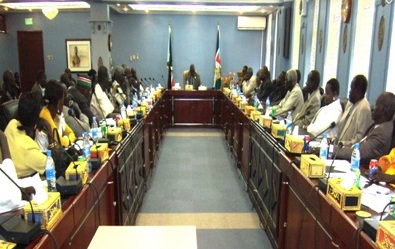S. Sudan withdraws $2.6bn financial offer to Khartoum
February 18, 2011 (JUBA) — South Sudan on Friday said it had withdrawn
the $2.6bn offer it initially proposed as financial transitional assistance to Sudan in return for resolving the Abyei dispute, border issues and other outstanding issues between the two nations.

The $2.6bn was earmarked to be paid to Khartoum over a four year period.
“The $2.6bn is no longer on the table of the African Union High Level
Implementation Panel (AUHIP) because the Republic of Sudan is not responding
positively as to this gesture,” said Barnaba Benjamin Marial.
South Sudan did make an offer to assist in Khartoum’s transition from dependence on Southern oil revenues, a figure judged reasonable by economists of the International Monetary Fund (IMF) and the African Union (AU).
The IMF estimates that apart from this new dispute between the two, the secession of South Sudan could cost Sudan more than $7.7 billion in lost revenues over the next four years.
On Tuesday, talks between the two failed after both nations failed to reach a compromise after five days of negotiations in the Ethiopian capital. A proposal tabled by Khartoum detailing its position on oil transit fees and how it should be calculated per barrel of crude exported by South Sudan through the pipelines was rejected by their Southern counterparts.
Khartoum’s demand of $36 per barrel of oil has been described by South Sudan as unrealistic, with the latter suggesting the fee should be around $1 per barrel.
Last week, the UK based charity Global Witness urged the AU, China, and western governments devise immediate remedies to the current dispute between Sudan and South Sudan, amidst heightened tension and talk of war.
“The AU, China, the US, UK, and Norway in particular must engage at the highest diplomatic levels to broker a deal between the two sides,” said Dana Wilkins, Global Witness campaigner.
“The longer this dispute goes on and both economies continue to suffer, the more likely it is that the situation will escalate”.
Oil revenues account for more than 98% of South Sudan’s annual budget.
(ST)
